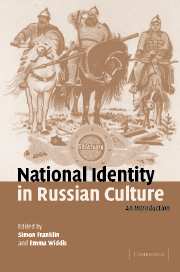Book contents
- Frontmatter
- Contents
- List of illustrations
- Notes on contributors
- Preface
- Note on the transliteration of Russian
- Map: The growth and contraction of Russia and its empire
- 1 ‘All the Russias …’?
- SECTION I IDENTITIES IN TIME AND SPACE
- SECTION II CONTRASTIVE IDENTITIES: ‘US’ AND ‘THEM’
- SECTION III ‘ESSENTIAL’ IDENTITIES
- SECTION IV SYMBOLS OF IDENTITY
- Afterword
- Notes
- Selected further reading in English
- Index
SECTION III - ‘ESSENTIAL’ IDENTITIES
Published online by Cambridge University Press: 04 May 2010
- Frontmatter
- Contents
- List of illustrations
- Notes on contributors
- Preface
- Note on the transliteration of Russian
- Map: The growth and contraction of Russia and its empire
- 1 ‘All the Russias …’?
- SECTION I IDENTITIES IN TIME AND SPACE
- SECTION II CONTRASTIVE IDENTITIES: ‘US’ AND ‘THEM’
- SECTION III ‘ESSENTIAL’ IDENTITIES
- SECTION IV SYMBOLS OF IDENTITY
- Afterword
- Notes
- Selected further reading in English
- Index
Summary
In this book, we apply the word ‘essentialist’ to the idea that national identity is innate, timeless, intrinsic to the age-old character of the people. And where, according to the essentialist supposition, does one find signs of this deeply embedded, pristine and perfect Russianness? In the most basic and fundamental spheres of human expression and activity: in the songs and words and spiritual beliefs of the people, in the habits and patterns of daily life. Whether explicitly or implicitly, many types of discourse on Russian identity are founded on such essentialist assumptions. Each of the four chapters in this Section – on religion, music, language, and everyday life – begins by explaining the essentialist position, and then proceeds to illustrate some of the issues and problems (different in each case) that arise from it.
Religious identity has already been, and will again be, mentioned in several chapters. Russia, it is said, has traditionally been a Christian country, a land of Orthodoxy. The generalization can hide extreme contrasts of opinion: from the view that Russian culture emerged in a Christian context which it thankfully escaped on encountering the Enlightenment, to the prescriptive view that a ‘true’ Russian must be a practising and believing Orthodox Christian. Chapter 6 surveys the relations between Christian identity and the dominant culture from the Middle Ages to the present day, and then looks in more detail at a specific question: that of the tensions and accommodations between, on the one hand, a sense of religious identity – or at least of religious emblems as signs of the national identity – and, on the other hand, the predominantly ‘secular’ forms of modern culture.
- Type
- Chapter
- Information
- National Identity in Russian CultureAn Introduction, pp. 93 - 94Publisher: Cambridge University PressPrint publication year: 2004



